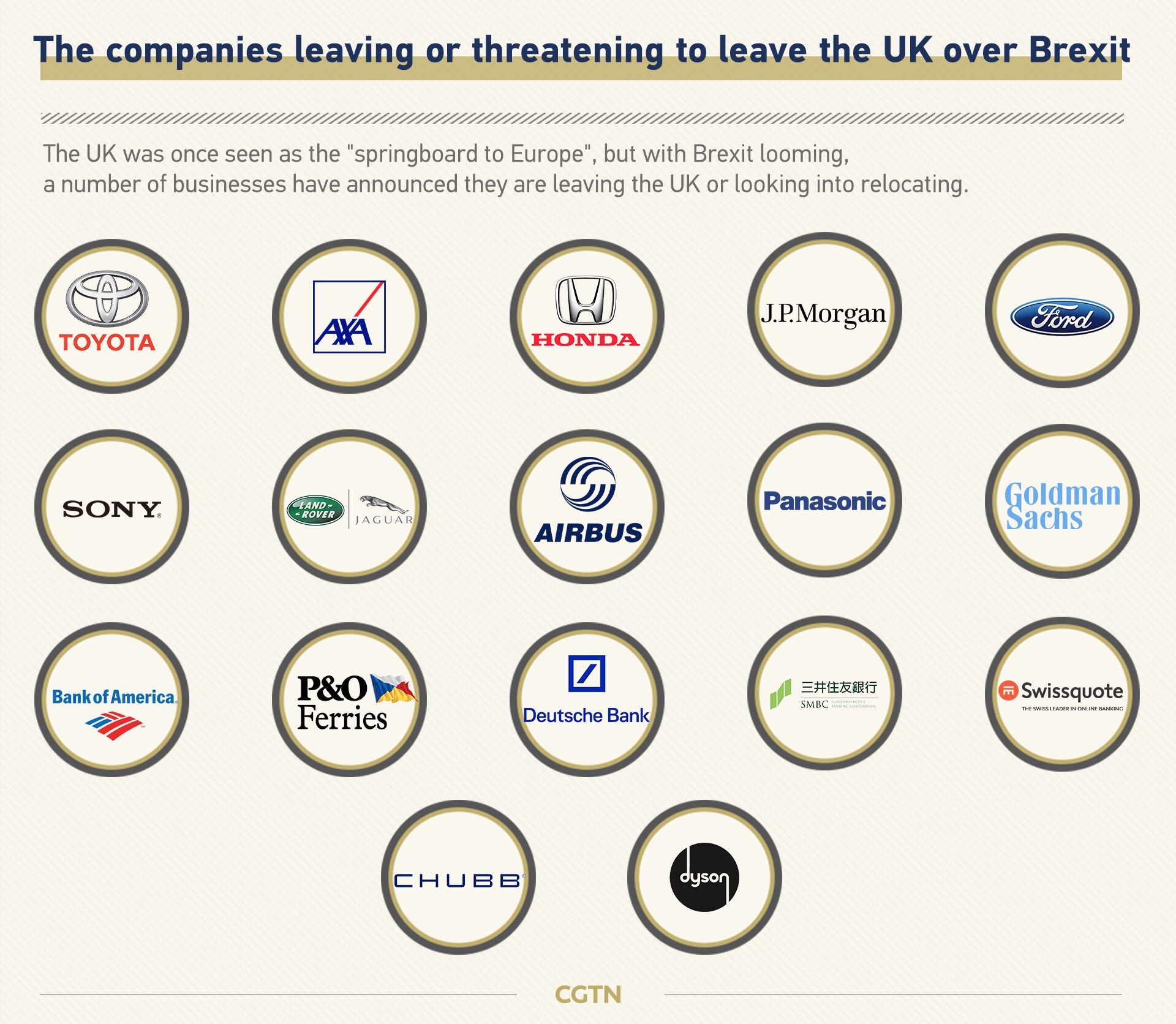
Economy
09:14, 25-Mar-2019
Shifting investment winds blow over Britain in Brexit chaos
CGTN

With just a week to go until Britain is due to meet the legal limbo of Brexit next Friday, the country's economy is in the face of mixed signals of slowing growth and low unemployment, with crowds of enterprises in a rush to getting away and hordes of Chinese investors coming in.
Britain is also buffeted by the slowing Eurozone economy and tit-for-tat trade tensions, exacerbating the difficulties ahead.
UK economy ahead of Brexit
The world's fifth largest economy notched up GDP growth of 1.4 percent to the tune of 2.629 trillion U.S. dollars last year after expanding by 1.8 percent in 2017. The increment speed is projected by the Organization for Economic Co-operation and Development (OECD) to be dragged down further to 0.8 percent this year on account of global headwinds and Brexit chaos.
The pound has dipped about 12 percent to the U.S. dollar since June 2016 and over 10 percent against the euro, which to some extent peps up exports of the country's goods and services to those with strong currencies, according to AFP.

Despite the lowest unemployment rate of four percent since 1975 and an annual inflation rate at a two-year low of 1.8 percent, Britain's consumer confidence has now hit rock bottom, at a five-year low, according to Germany's largest market research institute GfK.
According to the UK Office for National Statistics (ONS), companies' British investments dipped 1.4 percent in the fourth quarter of 2018 compared with the third quarter, and sluggish growth has been posted in household spending in the last two years.
Companies press Brexit panic button
Concerns about Britain crashing out of the EU or a no-deal Brexit has swept through the globe. Many enterprises have announced they are leaving Britain or looking into relocating in the event of a chaotic split that would spook financial markets and dislocate trade flows across Europe and beyond.
The country was once seen as the "springboard to Europe," but with the uncertainties looming over Brexit, an array of big-name companies join the team to flee from Britain or threaten to leave, ranging from financial magnates of Citigroup, Goldman Sach, Barclays and Nomura Holdings to auto giants such as Honda and Nissan.
A recent report on financial markets by think tank New Financial indicated that more than 275 financial companies are now transferring a total of 925 billion pounds of assets and thousands of British employees to the EU to prepare for Brexit, at the cost of over four billion U.S. dollars.

Toyota Europe's chief executive Johan van Zyl has warned it may end production in Britain by 2023 under a no-deal Brexit, noting "if the business environment becomes very, very difficult to operate, it should be on the agenda as well."
It is reported that the most popular destination for British financial companies is Dublin, the capital city of Ireland, followed by Luxembourg, Paris, Frankfurt and Amsterdam in order.
Hungry Chinese investors
Despite the dark clouds looming over Brexit all the while, Britain remains a paradise for keen Chinese investors in view of the weak pound, fabulous business climate, and more complicated social and political environments in the U.S. and EU.
Chinese foreign direct investment into the country shot up 40 percent to 2.07 billion U.S. dollars in 2017 compared with the previous year, and during the same period two-way trade volume rose five billion U.S. dollars to the tune of 19 billion U.S. dollars, data from the National Bureau of Statistics (NBS) showed.
But investors from China are now shifting their sights to more strategic, intellectual property-oriented equity transactions, moving from the sectors of real estate, gaming and consumer goods to the pharmaceutical, biotechnological and education industries and disclosing Chinese investors' fever for R&D.
Strategic Switch's investment for a stake in data center operator Global Switch, Huadong Medicine's acquisition of SinclairPharma, and Ligeance Aerospace Technology Co., Ltd.'s acquisition of Gardner Aerospace, a tier one supplier of aerospace detailed parts and assemblies, are just examples of Chinese investors' investment in Britain.

SITEMAP
Copyright © 2018 CGTN. Beijing ICP prepared NO.16065310-3
Copyright © 2018 CGTN. Beijing ICP prepared NO.16065310-3